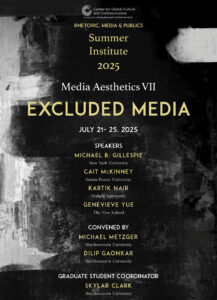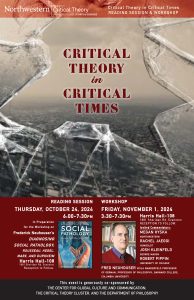
Call for Applications
2024 Summer Institute in Rhetoric, Media and Publics
Northwestern University, Evanston, IL 60208
In Person
July 15–19, 2024
The deadline for applications is Monday 27 May 2024
Conveners:
Michael Streicher Metzger (Pick-Laudati Academic Curator of Cinema and Media Arts, Block Museum, Northwestern University)
Dilip Gaonkar (Rhetoric, Media, and Publics, Northwestern University)
Media Aesthetics VI: Shared Grounds of Media Aesthetics and Ecology
From seawater to fog, fiber-optic networks to the cloud, prominent recent theories of environmental media have traced their objects’ distributed and often ineffable dimensions across the artificial boundaries between nature and technology, between nations and ecosystems, and between disciplines. While atmospheric and elemental thinking has revealed the constitutive role of media in the production and recognition of ecological relations, questions of aesthetics in eco-media—how media objects induce pain or pleasure, stimulate individual and social experience, and shape the envelope linking sensing bodies with surrounding conditions—offer ample space for exploration. Indeed, media remain entrenched in stubbornly terrestrial concerns, such as the geographically-specific lived realities of climate change, enduring edifices of colonial domination, material regimes of resource extraction and displacement, and embodied strategies of resistance, just as media studies remains institutionally and intellectually tethered to the study of artworks, representations, and structured acts of perception.
Rather than staging a contest between aesthetics and environmental media theory, the theme of this iteration of the Media Aesthetics Summer Institute, “Shared Grounds of Media Aesthetics and Ecology,” instead proposes that aesthetics might serve to anchor overlapping interdisciplinary conversations and allow a collective concern for more ecologically conscious scholarship to take root. How might situating aesthetics as a “shared ground” of inquiry invite new insights into diverse assemblages of media techniques, infrastructures, and human and nonhuman actors, as well as the socio-historical and phenomenological conditions that underlie them? What kinds of histories come into focus when we turn our eyes to the environmental and geological substrates of affect and sensation? What kind of projects might serve as a foundation or a bridge to more aesthetically engaged, conceptually capacious, and sustainable forms of media scholarship?
Institute Format and Application Process
The institute will consist of five days of presentations and discussions led by visiting scholars and Northwestern faculty. This year’s visiting scholars include Weihong Bao (University of California, Berkeley), Debashree Mukherjee (Columbia University), Ayesha Omer (York University), and Thomas Patrick Pringle (University of Southern California). This year’s Media Aesthetics summer institute will also feature one or more screenings of thematically and historically relevant film and media works, to be hosted at Northwestern’s Block Museum of Art.
The institute is sponsored by the Center for Global Culture and Communication (CGCC), an interdisciplinary initiative of Northwestern University’s School of Communication. The CGCC will subsidize transportation (up to $250), lodging (single occupancy), and some meals (breakfast and lunch every day and two group dinners) for admitted students. Applicants should send a brief letter of nomination from their academic advisor, along with a one-page statement explaining their interest in participating in this year’s institute, to the summer institute coordinator Eva Rubens Célem (evacelem@u.northwestern.edu) We will adopt a policy of rolling admissions. Priority will therefore be granted to strong applications that are submitted in a timely fashion, preferably by Monday 27 May 2024. All inquiries should be directed to Eva Rubens Célem.
Faculty Bios:
Weihong Bao is Pamela P. Fong and Family Distinguished Chair in China Studies and an Associate Professor of Film and Media & East Asian Languages and Cultures, UC Berkeley. She is the author of Fiery Cinema: The Emergence of an Affective Medium in China, 1915-1945 (University of Minnesota Press, 2015), as well as numerous articles on comparative media history and theory, media and environment, early cinema, war and modernity, affect theory, propaganda theory and practice, and Chinese language cinema of all periods and regions. Her more recent work exploring the relationship between medium and environment includes co-editing two special issues on “Media/Climates” (Representations) and “Medium/Environment” (Critical Inquiry) and a forthcoming book, Background Matters: Set Design Thinking and The Art of Environment.
Ayesha Omer is Assistant Professor of Digital Futures at York University. Her scholarship examines the relationship between infrastructures, environments, and politics. Her book project, Networks of Dust, explores issues of technological mediation, environmental relations, and political sovereignty with respect to Chinese infrastructure in the indigenous borderlands of the Pakistani state, as part of the China-Pakistan Economic Corridor (CPEC)-a flagship project of China’s global Belt and Road Initiative (BRI). She has a background in mixed-media, public performance art and her artistic and academic work has appeared in ArtNow, Cityscapes, Tanqeed, and Cultural Studies
Debashree Mukherjee is Associate Professor of film and media in the Department of Middle Eastern, South Asian, and African Studies (MESAAS) at Columbia University. She is author of Bombay Hustle: Making Movies in a Colonial City (2020), which approaches film history as an ecology of material practices and practitioners. Her current book project, Tropical Machines: Extractive Media and Plantation Modernity, develops a media history of South Asian indentured migration from the 1830s onwards. Debashree edits the peer-reviewed journal BioScope: South Asian Screen Studies and has published in journals such as Film History, Film Quarterly, Feminist Media Histories, Representations, and Modern Asian Studies. Her latest publication is the edited anthology, Bombay Talkies: An Unseen History of Indian Cinema, based on an unprecedented photographic archive collated by a German cinematographer who emigrated to India in the 1930s (Mapin & Alkazi Foundation, 2023).
Thomas Patrick Pringle is Assistant Professor of Cinema and Media Studies at University of Southern California. Pringle focuses on historical approaches to film and media, with an emphasis on how media shape how environments are conceived in a given place and time and how technologies interact with physical environments. With Gertrud Koch and the late Bernard Stiegler, Pringle co-authored Machine (University of Minnesota Press/Meson Press, 2019). His writing on cinema, media, and the environment appears in the journals New Media & Society, Spectator, Heliotrope, NECSUS: European Journal of Media Studies, and Journal of Film and Video, as well as the volume Toxic Immanence: Decolonizing Nuclear Legacies and Futures (ed. Livia Monnet, 2022). His book manuscript, titled The Climate Proxy, looks to archival cinema and media, as well as critical appropriation film practices, to explain why certain images stand in for, or dispute, global warming.
 The Center of Global Culture and Communication (An interdisciplinary initiative of Northwestern University’s School of Communication)
The Center of Global Culture and Communication (An interdisciplinary initiative of Northwestern University’s School of Communication)
 Cannibal Capitalism
Cannibal Capitalism Summer School, July 1-6, 2024
Summer School, July 1-6, 2024 Making Space for Justice
Making Space for Justice Neither Settler Nor Native
Neither Settler Nor Native Currents in media studies over recent decades have not only expanded the range of scholarly inquiries into once-marginalized historical and cultural subjects, but broadened our recognition of what constitutes media in the first place. Indeed, inherently decentralizing studies of the networks, industries, infrastructures, and ecologies of communication have reinforced and deepened the push to recover suppressed histories and offer alternatives to dominant frameworks and narratives; excluded subjects often come into view where the signatures of mediation are at their most dispersed.
Currents in media studies over recent decades have not only expanded the range of scholarly inquiries into once-marginalized historical and cultural subjects, but broadened our recognition of what constitutes media in the first place. Indeed, inherently decentralizing studies of the networks, industries, infrastructures, and ecologies of communication have reinforced and deepened the push to recover suppressed histories and offer alternatives to dominant frameworks and narratives; excluded subjects often come into view where the signatures of mediation are at their most dispersed.

 Insurgent Universality
Insurgent Universality
